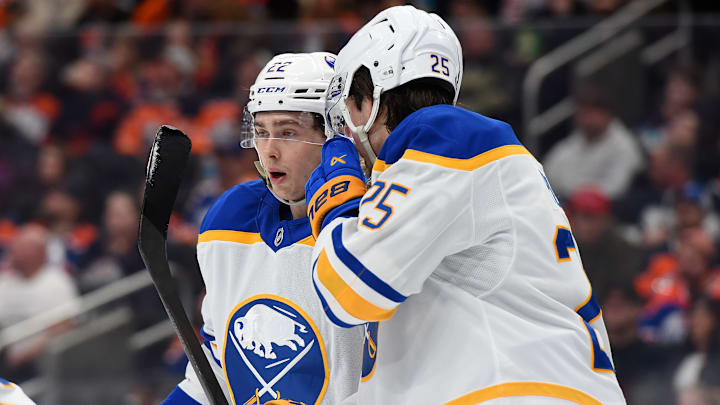Tage Thompson, Rasmus Dahlin and Alex Tuch have overcome sluggish starts to the 2025-26 season to become their typical high-impact contributors in recent games, which is the main reason the Buffalo Sabres have shown signs of turning their roller-coaster campaign around.
Not every struggling Sabres player is suddenly producing at an elite level, though. Defenseman Owen Power and forward Jack Quinn continue to play well below their potential in what was viewed as a possible turning-point year for both Buffalo lineup stalwarts.
Given general manager Kevyn Adams' continued inaction when it comes to adding talent to the roster, the Blue and Gold will likely need either Power or Quinn (and preferably both) to find another gear in the weeks ahead if the team wants to climb the Eastern Conference standings.
That sets the stage for the next topic in our Sabres debates series, which covers some of the most pressing topics facing the club this season.
Which key player is creating more unease for the Buffalo Sabres with their underwhelming performance in 2025-26?
The case for Owen Power
You'd have received a look of puzzling looks if you predicted before the season that Mattias Samuelsson would have more points (eight) than Power (seven) nearly a quarter of the way into the season, but that's the reality.
Power, 22, always receives more criticism than is probably warranted because he's a 6-foot-6 defenseman who doesn't play with a physical edge. Yet, critiques related to the fact he doesn't use that frame nearly enough to create leverage in the defensive zone are legitimate. It remains a serious problem.
Yet, the University of Michigan product typically offset his defensive weaknesses with offensive strengths. That hasn't been the case in the early stages of the season, however. He's on pace for just 32 points, which would be the lowest full-season total of his career.
Power's underlying numbers are a little more promising, though.
He ranks second among full-time Buffalo defensemen in 5-on-5 expected goals for percentage (xGF%) at 51.4% behind only Samuelsson (54.2%), per Natural Stat Trick. He's also second on the team in scoring chances against per 60 minutes at 5-on-5 (24.5).
So, while the baseline numbers are lackluster and eye test isn't exactly doing him a ton of favors, the analytics suggest a turnaround is possible, if not probable. It's still fair to debate whether he'll ever reach the expectations of a No. 1 overall pick, though.
Ultimately, the Sabres need to see concrete improvement in his on-ice performance, not just a good showing in the advanced metrics.
The case for Jack Quinn
Quinn has never looked the same after his 2023 Achilles injury. The winger was never a top-tier NHL skater, and now he's seemingly always a stride or two behind the play, which isn't ideal now that he's over two years removed from the injury.
The 24-year-old Canadian has recorded just eight points (three goals and five assists) in 19 appearances. He's scored only one goal at even strength and he's generating less than two shots on goal per game. That's not what the Sabres need from an offense-first player.
His lack of involvement in the attacking zone is particularly frustrating for Buffalo, which hoped Quinn was capable of stepping up to fill the void left by JJ Peterka, his former linemate. He's also had more chances to play in the top six as the Sabres dealt with a rash of forward injuries.
Like Power, the analytics do paint a better picture as Quinn has been on the ice for 53% of the high-danger chances at 5-on-5 and is only slightly below the break-even point in xGF% (49.9%), per NST. But, once again, the actual results matter most in the end.
Quinn is running out of time to get back on the trajectory toward becoming a 30-goal scorer, which looked like his destiny early in his NHL career.
Final verdict: Quinn is the bigger concern
Power is never going to play the most visually appealing hockey for a player of his size, but he's still generally effective. The debate about whether he'll reach his potential as the first pick of the 2021 draft is different from whether he can help the Sabres win games.
Meanwhile, Quinn hasn't been able to build off his strong finish to last season and could be in danger of losing playing time as Buffalo gets forwards back from injury.
Given the hot-and-cold nature of the Sabres' offense so far this season, more production from Quinn would have gone a long way in creating some stability. He's proven capable of providing that boost in the past, but it just hasn't happened this year.
Add in the uncertainty about whether he'll physically ever get back to where he was before the Achilles injury and there are simply too many question marks to have full confidence in a turnaround.
One offensive surge from Quinn could always change the narrative, though.
